Contract Law: Analyzing Contractual Issues in Hyacinth v Lenny
VerifiedAdded on 2023/06/10
|10
|3620
|357
Case Study
AI Summary
This case study analyzes a contract law scenario between Hyacinth and Lenny, focusing on whether Hyacinth is obligated to pay Lenny £175 for carpeting and an extra £30 for painting. The analysis covers essential elements of a contract, including offer, acceptance, and consideration, with reference to relevant case laws like Hyde v Wrench and Stilk v Myrick. It also examines the concept of existing duty and its exceptions, particularly when a promisee is contractually bound to a third party, referencing Williams v Roffey Bros. Furthermore, the study delves into the validity and enforceability of the limitation clause in the contract, considering aspects like incorporation, clarity, and statutory control under the Unfair Contract Terms Act 1977 and the Unfair Terms in Consumer Contracts Regulations 1999, along with case law Smith V Eric Bush. The application of these legal principles to the facts determines the parties' rights and obligations.
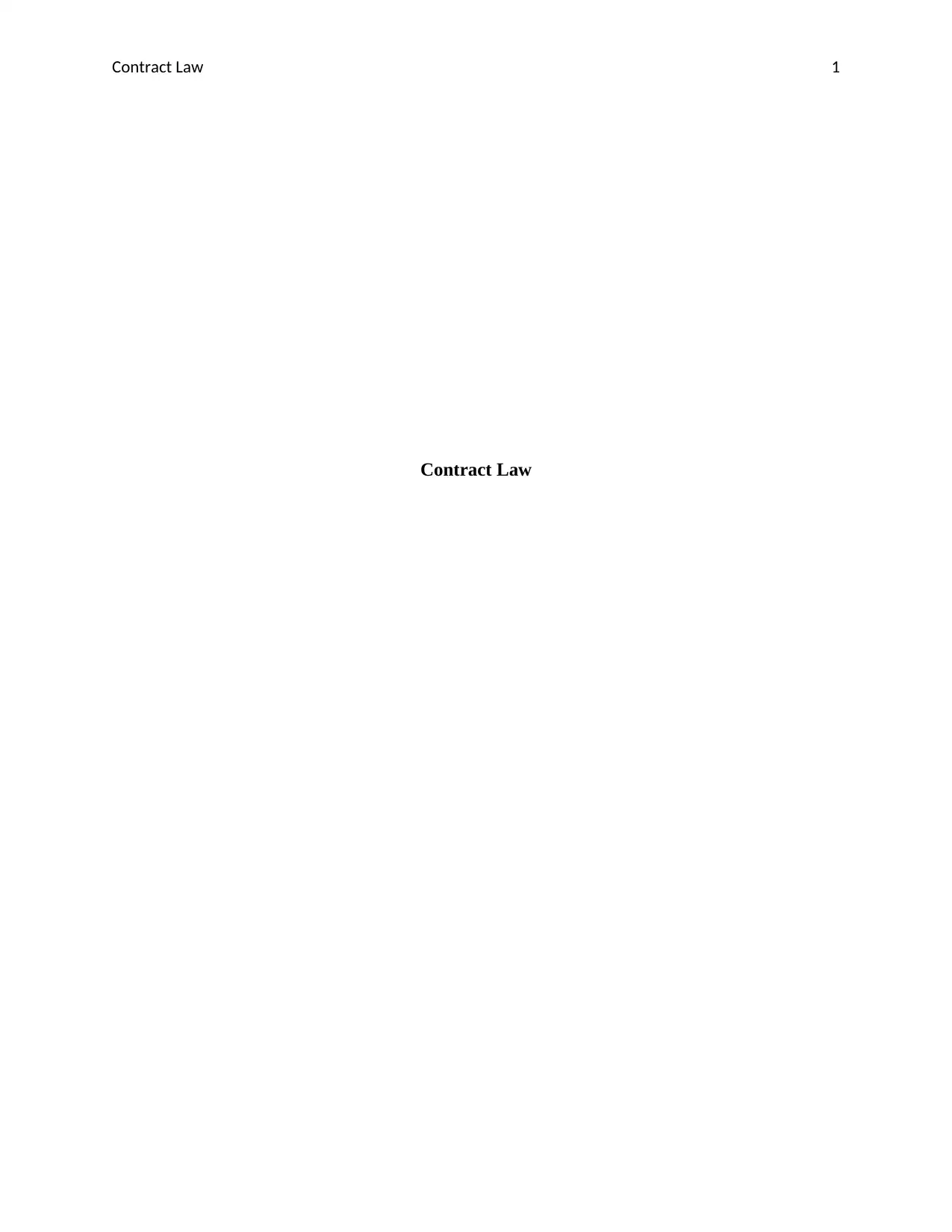
Contract Law 1
Contract Law
Contract Law
Paraphrase This Document
Need a fresh take? Get an instant paraphrase of this document with our AI Paraphraser
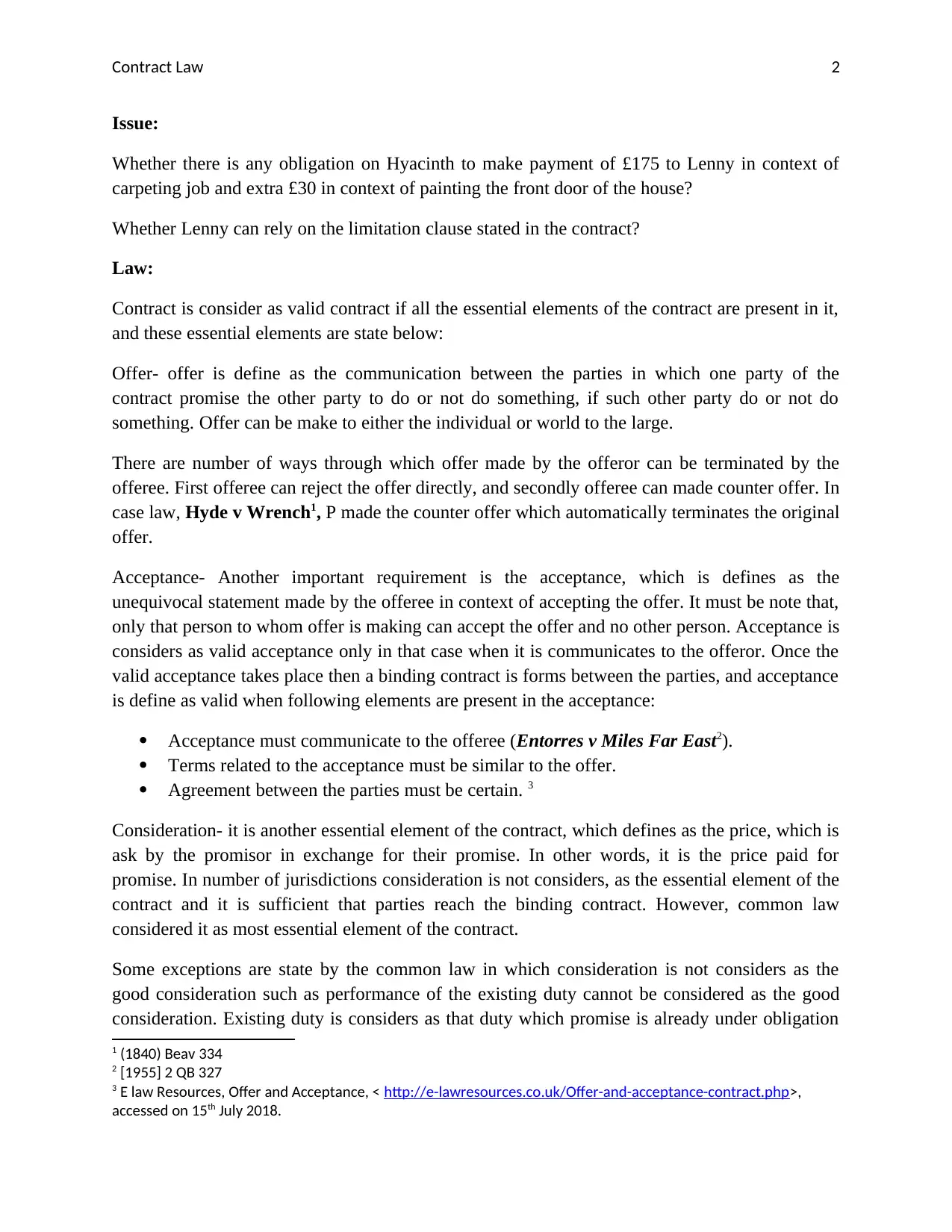
Contract Law 2
Issue:
Whether there is any obligation on Hyacinth to make payment of £175 to Lenny in context of
carpeting job and extra £30 in context of painting the front door of the house?
Whether Lenny can rely on the limitation clause stated in the contract?
Law:
Contract is consider as valid contract if all the essential elements of the contract are present in it,
and these essential elements are state below:
Offer- offer is define as the communication between the parties in which one party of the
contract promise the other party to do or not do something, if such other party do or not do
something. Offer can be make to either the individual or world to the large.
There are number of ways through which offer made by the offeror can be terminated by the
offeree. First offeree can reject the offer directly, and secondly offeree can made counter offer. In
case law, Hyde v Wrench1, P made the counter offer which automatically terminates the original
offer.
Acceptance- Another important requirement is the acceptance, which is defines as the
unequivocal statement made by the offeree in context of accepting the offer. It must be note that,
only that person to whom offer is making can accept the offer and no other person. Acceptance is
considers as valid acceptance only in that case when it is communicates to the offeror. Once the
valid acceptance takes place then a binding contract is forms between the parties, and acceptance
is define as valid when following elements are present in the acceptance:
Acceptance must communicate to the offeree (Entorres v Miles Far East2).
Terms related to the acceptance must be similar to the offer.
Agreement between the parties must be certain. 3
Consideration- it is another essential element of the contract, which defines as the price, which is
ask by the promisor in exchange for their promise. In other words, it is the price paid for
promise. In number of jurisdictions consideration is not considers, as the essential element of the
contract and it is sufficient that parties reach the binding contract. However, common law
considered it as most essential element of the contract.
Some exceptions are state by the common law in which consideration is not considers as the
good consideration such as performance of the existing duty cannot be considered as the good
consideration. Existing duty is considers as that duty which promise is already under obligation
1 (1840) Beav 334
2 [1955] 2 QB 327
3 E law Resources, Offer and Acceptance, < http://e-lawresources.co.uk/Offer-and-acceptance-contract.php>,
accessed on 15th July 2018.
Issue:
Whether there is any obligation on Hyacinth to make payment of £175 to Lenny in context of
carpeting job and extra £30 in context of painting the front door of the house?
Whether Lenny can rely on the limitation clause stated in the contract?
Law:
Contract is consider as valid contract if all the essential elements of the contract are present in it,
and these essential elements are state below:
Offer- offer is define as the communication between the parties in which one party of the
contract promise the other party to do or not do something, if such other party do or not do
something. Offer can be make to either the individual or world to the large.
There are number of ways through which offer made by the offeror can be terminated by the
offeree. First offeree can reject the offer directly, and secondly offeree can made counter offer. In
case law, Hyde v Wrench1, P made the counter offer which automatically terminates the original
offer.
Acceptance- Another important requirement is the acceptance, which is defines as the
unequivocal statement made by the offeree in context of accepting the offer. It must be note that,
only that person to whom offer is making can accept the offer and no other person. Acceptance is
considers as valid acceptance only in that case when it is communicates to the offeror. Once the
valid acceptance takes place then a binding contract is forms between the parties, and acceptance
is define as valid when following elements are present in the acceptance:
Acceptance must communicate to the offeree (Entorres v Miles Far East2).
Terms related to the acceptance must be similar to the offer.
Agreement between the parties must be certain. 3
Consideration- it is another essential element of the contract, which defines as the price, which is
ask by the promisor in exchange for their promise. In other words, it is the price paid for
promise. In number of jurisdictions consideration is not considers, as the essential element of the
contract and it is sufficient that parties reach the binding contract. However, common law
considered it as most essential element of the contract.
Some exceptions are state by the common law in which consideration is not considers as the
good consideration such as performance of the existing duty cannot be considered as the good
consideration. Existing duty is considers as that duty which promise is already under obligation
1 (1840) Beav 334
2 [1955] 2 QB 327
3 E law Resources, Offer and Acceptance, < http://e-lawresources.co.uk/Offer-and-acceptance-contract.php>,
accessed on 15th July 2018.
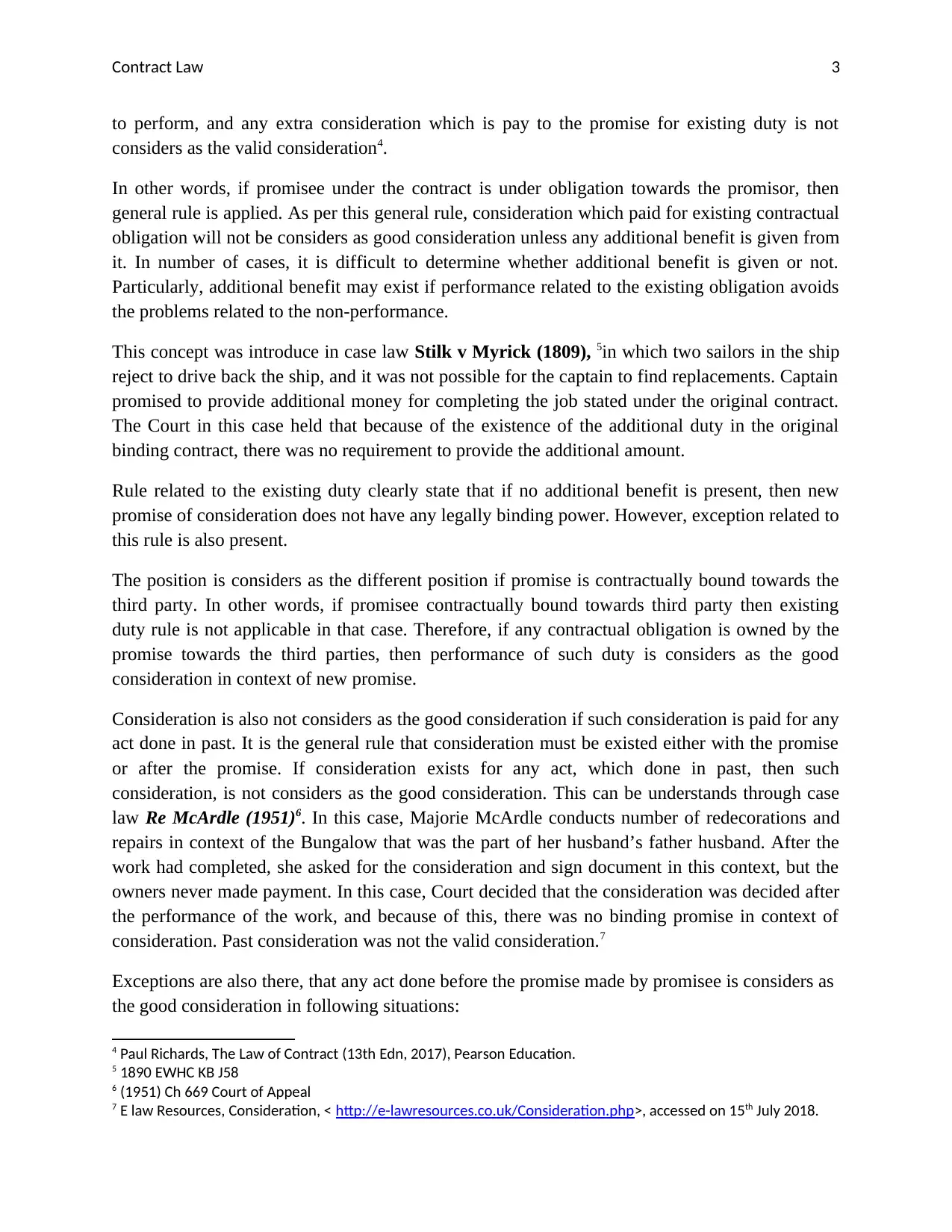
Contract Law 3
to perform, and any extra consideration which is pay to the promise for existing duty is not
considers as the valid consideration4.
In other words, if promisee under the contract is under obligation towards the promisor, then
general rule is applied. As per this general rule, consideration which paid for existing contractual
obligation will not be considers as good consideration unless any additional benefit is given from
it. In number of cases, it is difficult to determine whether additional benefit is given or not.
Particularly, additional benefit may exist if performance related to the existing obligation avoids
the problems related to the non-performance.
This concept was introduce in case law Stilk v Myrick (1809), 5in which two sailors in the ship
reject to drive back the ship, and it was not possible for the captain to find replacements. Captain
promised to provide additional money for completing the job stated under the original contract.
The Court in this case held that because of the existence of the additional duty in the original
binding contract, there was no requirement to provide the additional amount.
Rule related to the existing duty clearly state that if no additional benefit is present, then new
promise of consideration does not have any legally binding power. However, exception related to
this rule is also present.
The position is considers as the different position if promise is contractually bound towards the
third party. In other words, if promisee contractually bound towards third party then existing
duty rule is not applicable in that case. Therefore, if any contractual obligation is owned by the
promise towards the third parties, then performance of such duty is considers as the good
consideration in context of new promise.
Consideration is also not considers as the good consideration if such consideration is paid for any
act done in past. It is the general rule that consideration must be existed either with the promise
or after the promise. If consideration exists for any act, which done in past, then such
consideration, is not considers as the good consideration. This can be understands through case
law Re McArdle (1951)6. In this case, Majorie McArdle conducts number of redecorations and
repairs in context of the Bungalow that was the part of her husband’s father husband. After the
work had completed, she asked for the consideration and sign document in this context, but the
owners never made payment. In this case, Court decided that the consideration was decided after
the performance of the work, and because of this, there was no binding promise in context of
consideration. Past consideration was not the valid consideration.7
Exceptions are also there, that any act done before the promise made by promisee is considers as
the good consideration in following situations:
4 Paul Richards, The Law of Contract (13th Edn, 2017), Pearson Education.
5 1890 EWHC KB J58
6 (1951) Ch 669 Court of Appeal
7 E law Resources, Consideration, < http://e-lawresources.co.uk/Consideration.php>, accessed on 15th July 2018.
to perform, and any extra consideration which is pay to the promise for existing duty is not
considers as the valid consideration4.
In other words, if promisee under the contract is under obligation towards the promisor, then
general rule is applied. As per this general rule, consideration which paid for existing contractual
obligation will not be considers as good consideration unless any additional benefit is given from
it. In number of cases, it is difficult to determine whether additional benefit is given or not.
Particularly, additional benefit may exist if performance related to the existing obligation avoids
the problems related to the non-performance.
This concept was introduce in case law Stilk v Myrick (1809), 5in which two sailors in the ship
reject to drive back the ship, and it was not possible for the captain to find replacements. Captain
promised to provide additional money for completing the job stated under the original contract.
The Court in this case held that because of the existence of the additional duty in the original
binding contract, there was no requirement to provide the additional amount.
Rule related to the existing duty clearly state that if no additional benefit is present, then new
promise of consideration does not have any legally binding power. However, exception related to
this rule is also present.
The position is considers as the different position if promise is contractually bound towards the
third party. In other words, if promisee contractually bound towards third party then existing
duty rule is not applicable in that case. Therefore, if any contractual obligation is owned by the
promise towards the third parties, then performance of such duty is considers as the good
consideration in context of new promise.
Consideration is also not considers as the good consideration if such consideration is paid for any
act done in past. It is the general rule that consideration must be existed either with the promise
or after the promise. If consideration exists for any act, which done in past, then such
consideration, is not considers as the good consideration. This can be understands through case
law Re McArdle (1951)6. In this case, Majorie McArdle conducts number of redecorations and
repairs in context of the Bungalow that was the part of her husband’s father husband. After the
work had completed, she asked for the consideration and sign document in this context, but the
owners never made payment. In this case, Court decided that the consideration was decided after
the performance of the work, and because of this, there was no binding promise in context of
consideration. Past consideration was not the valid consideration.7
Exceptions are also there, that any act done before the promise made by promisee is considers as
the good consideration in following situations:
4 Paul Richards, The Law of Contract (13th Edn, 2017), Pearson Education.
5 1890 EWHC KB J58
6 (1951) Ch 669 Court of Appeal
7 E law Resources, Consideration, < http://e-lawresources.co.uk/Consideration.php>, accessed on 15th July 2018.
⊘ This is a preview!⊘
Do you want full access?
Subscribe today to unlock all pages.

Trusted by 1+ million students worldwide
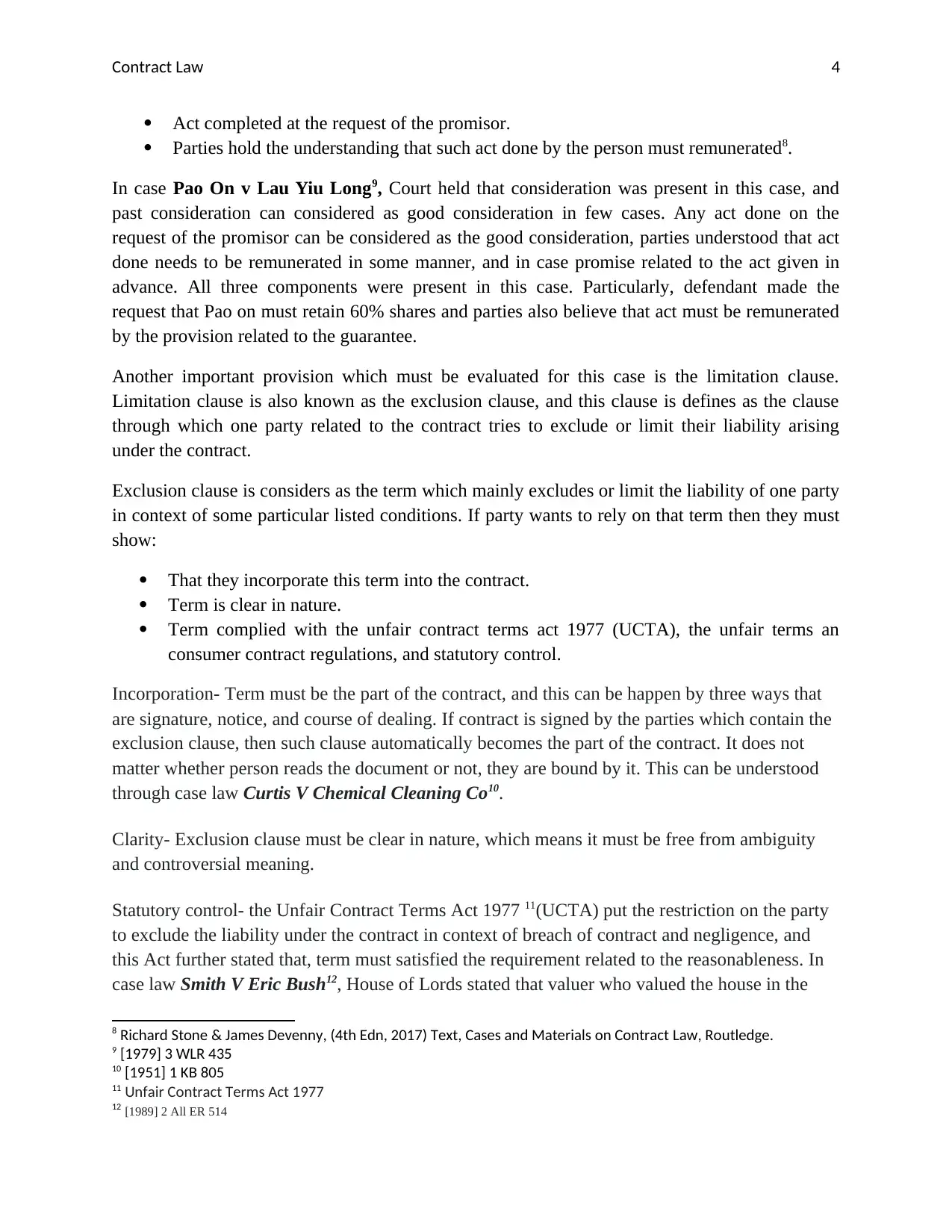
Contract Law 4
Act completed at the request of the promisor.
Parties hold the understanding that such act done by the person must remunerated8.
In case Pao On v Lau Yiu Long9, Court held that consideration was present in this case, and
past consideration can considered as good consideration in few cases. Any act done on the
request of the promisor can be considered as the good consideration, parties understood that act
done needs to be remunerated in some manner, and in case promise related to the act given in
advance. All three components were present in this case. Particularly, defendant made the
request that Pao on must retain 60% shares and parties also believe that act must be remunerated
by the provision related to the guarantee.
Another important provision which must be evaluated for this case is the limitation clause.
Limitation clause is also known as the exclusion clause, and this clause is defines as the clause
through which one party related to the contract tries to exclude or limit their liability arising
under the contract.
Exclusion clause is considers as the term which mainly excludes or limit the liability of one party
in context of some particular listed conditions. If party wants to rely on that term then they must
show:
That they incorporate this term into the contract.
Term is clear in nature.
Term complied with the unfair contract terms act 1977 (UCTA), the unfair terms an
consumer contract regulations, and statutory control.
Incorporation- Term must be the part of the contract, and this can be happen by three ways that
are signature, notice, and course of dealing. If contract is signed by the parties which contain the
exclusion clause, then such clause automatically becomes the part of the contract. It does not
matter whether person reads the document or not, they are bound by it. This can be understood
through case law Curtis V Chemical Cleaning Co10.
Clarity- Exclusion clause must be clear in nature, which means it must be free from ambiguity
and controversial meaning.
Statutory control- the Unfair Contract Terms Act 1977 11(UCTA) put the restriction on the party
to exclude the liability under the contract in context of breach of contract and negligence, and
this Act further stated that, term must satisfied the requirement related to the reasonableness. In
case law Smith V Eric Bush12, House of Lords stated that valuer who valued the house in the
8 Richard Stone & James Devenny, (4th Edn, 2017) Text, Cases and Materials on Contract Law, Routledge.
9 [1979] 3 WLR 435
10 [1951] 1 KB 805
11 Unfair Contract Terms Act 1977
12 [1989] 2 All ER 514
Act completed at the request of the promisor.
Parties hold the understanding that such act done by the person must remunerated8.
In case Pao On v Lau Yiu Long9, Court held that consideration was present in this case, and
past consideration can considered as good consideration in few cases. Any act done on the
request of the promisor can be considered as the good consideration, parties understood that act
done needs to be remunerated in some manner, and in case promise related to the act given in
advance. All three components were present in this case. Particularly, defendant made the
request that Pao on must retain 60% shares and parties also believe that act must be remunerated
by the provision related to the guarantee.
Another important provision which must be evaluated for this case is the limitation clause.
Limitation clause is also known as the exclusion clause, and this clause is defines as the clause
through which one party related to the contract tries to exclude or limit their liability arising
under the contract.
Exclusion clause is considers as the term which mainly excludes or limit the liability of one party
in context of some particular listed conditions. If party wants to rely on that term then they must
show:
That they incorporate this term into the contract.
Term is clear in nature.
Term complied with the unfair contract terms act 1977 (UCTA), the unfair terms an
consumer contract regulations, and statutory control.
Incorporation- Term must be the part of the contract, and this can be happen by three ways that
are signature, notice, and course of dealing. If contract is signed by the parties which contain the
exclusion clause, then such clause automatically becomes the part of the contract. It does not
matter whether person reads the document or not, they are bound by it. This can be understood
through case law Curtis V Chemical Cleaning Co10.
Clarity- Exclusion clause must be clear in nature, which means it must be free from ambiguity
and controversial meaning.
Statutory control- the Unfair Contract Terms Act 1977 11(UCTA) put the restriction on the party
to exclude the liability under the contract in context of breach of contract and negligence, and
this Act further stated that, term must satisfied the requirement related to the reasonableness. In
case law Smith V Eric Bush12, House of Lords stated that valuer who valued the house in the
8 Richard Stone & James Devenny, (4th Edn, 2017) Text, Cases and Materials on Contract Law, Routledge.
9 [1979] 3 WLR 435
10 [1951] 1 KB 805
11 Unfair Contract Terms Act 1977
12 [1989] 2 All ER 514
Paraphrase This Document
Need a fresh take? Get an instant paraphrase of this document with our AI Paraphraser
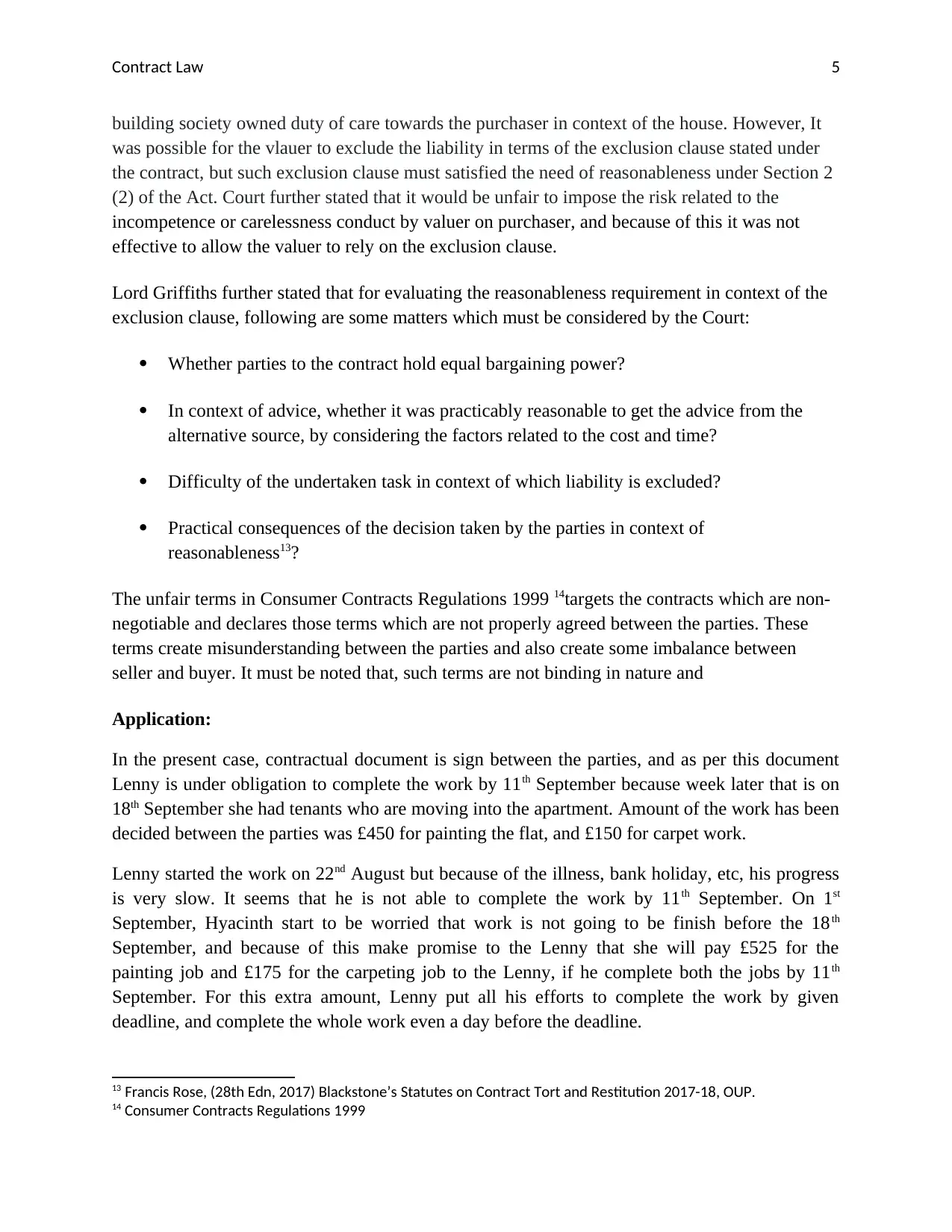
Contract Law 5
building society owned duty of care towards the purchaser in context of the house. However, It
was possible for the vlauer to exclude the liability in terms of the exclusion clause stated under
the contract, but such exclusion clause must satisfied the need of reasonableness under Section 2
(2) of the Act. Court further stated that it would be unfair to impose the risk related to the
incompetence or carelessness conduct by valuer on purchaser, and because of this it was not
effective to allow the valuer to rely on the exclusion clause.
Lord Griffiths further stated that for evaluating the reasonableness requirement in context of the
exclusion clause, following are some matters which must be considered by the Court:
Whether parties to the contract hold equal bargaining power?
In context of advice, whether it was practicably reasonable to get the advice from the
alternative source, by considering the factors related to the cost and time?
Difficulty of the undertaken task in context of which liability is excluded?
Practical consequences of the decision taken by the parties in context of
reasonableness13?
The unfair terms in Consumer Contracts Regulations 1999 14targets the contracts which are non-
negotiable and declares those terms which are not properly agreed between the parties. These
terms create misunderstanding between the parties and also create some imbalance between
seller and buyer. It must be noted that, such terms are not binding in nature and
Application:
In the present case, contractual document is sign between the parties, and as per this document
Lenny is under obligation to complete the work by 11th September because week later that is on
18th September she had tenants who are moving into the apartment. Amount of the work has been
decided between the parties was £450 for painting the flat, and £150 for carpet work.
Lenny started the work on 22nd August but because of the illness, bank holiday, etc, his progress
is very slow. It seems that he is not able to complete the work by 11th September. On 1st
September, Hyacinth start to be worried that work is not going to be finish before the 18th
September, and because of this make promise to the Lenny that she will pay £525 for the
painting job and £175 for the carpeting job to the Lenny, if he complete both the jobs by 11th
September. For this extra amount, Lenny put all his efforts to complete the work by given
deadline, and complete the whole work even a day before the deadline.
13 Francis Rose, (28th Edn, 2017) Blackstone’s Statutes on Contract Tort and Restitution 2017-18, OUP.
14 Consumer Contracts Regulations 1999
building society owned duty of care towards the purchaser in context of the house. However, It
was possible for the vlauer to exclude the liability in terms of the exclusion clause stated under
the contract, but such exclusion clause must satisfied the need of reasonableness under Section 2
(2) of the Act. Court further stated that it would be unfair to impose the risk related to the
incompetence or carelessness conduct by valuer on purchaser, and because of this it was not
effective to allow the valuer to rely on the exclusion clause.
Lord Griffiths further stated that for evaluating the reasonableness requirement in context of the
exclusion clause, following are some matters which must be considered by the Court:
Whether parties to the contract hold equal bargaining power?
In context of advice, whether it was practicably reasonable to get the advice from the
alternative source, by considering the factors related to the cost and time?
Difficulty of the undertaken task in context of which liability is excluded?
Practical consequences of the decision taken by the parties in context of
reasonableness13?
The unfair terms in Consumer Contracts Regulations 1999 14targets the contracts which are non-
negotiable and declares those terms which are not properly agreed between the parties. These
terms create misunderstanding between the parties and also create some imbalance between
seller and buyer. It must be noted that, such terms are not binding in nature and
Application:
In the present case, contractual document is sign between the parties, and as per this document
Lenny is under obligation to complete the work by 11th September because week later that is on
18th September she had tenants who are moving into the apartment. Amount of the work has been
decided between the parties was £450 for painting the flat, and £150 for carpet work.
Lenny started the work on 22nd August but because of the illness, bank holiday, etc, his progress
is very slow. It seems that he is not able to complete the work by 11th September. On 1st
September, Hyacinth start to be worried that work is not going to be finish before the 18th
September, and because of this make promise to the Lenny that she will pay £525 for the
painting job and £175 for the carpeting job to the Lenny, if he complete both the jobs by 11th
September. For this extra amount, Lenny put all his efforts to complete the work by given
deadline, and complete the whole work even a day before the deadline.
13 Francis Rose, (28th Edn, 2017) Blackstone’s Statutes on Contract Tort and Restitution 2017-18, OUP.
14 Consumer Contracts Regulations 1999
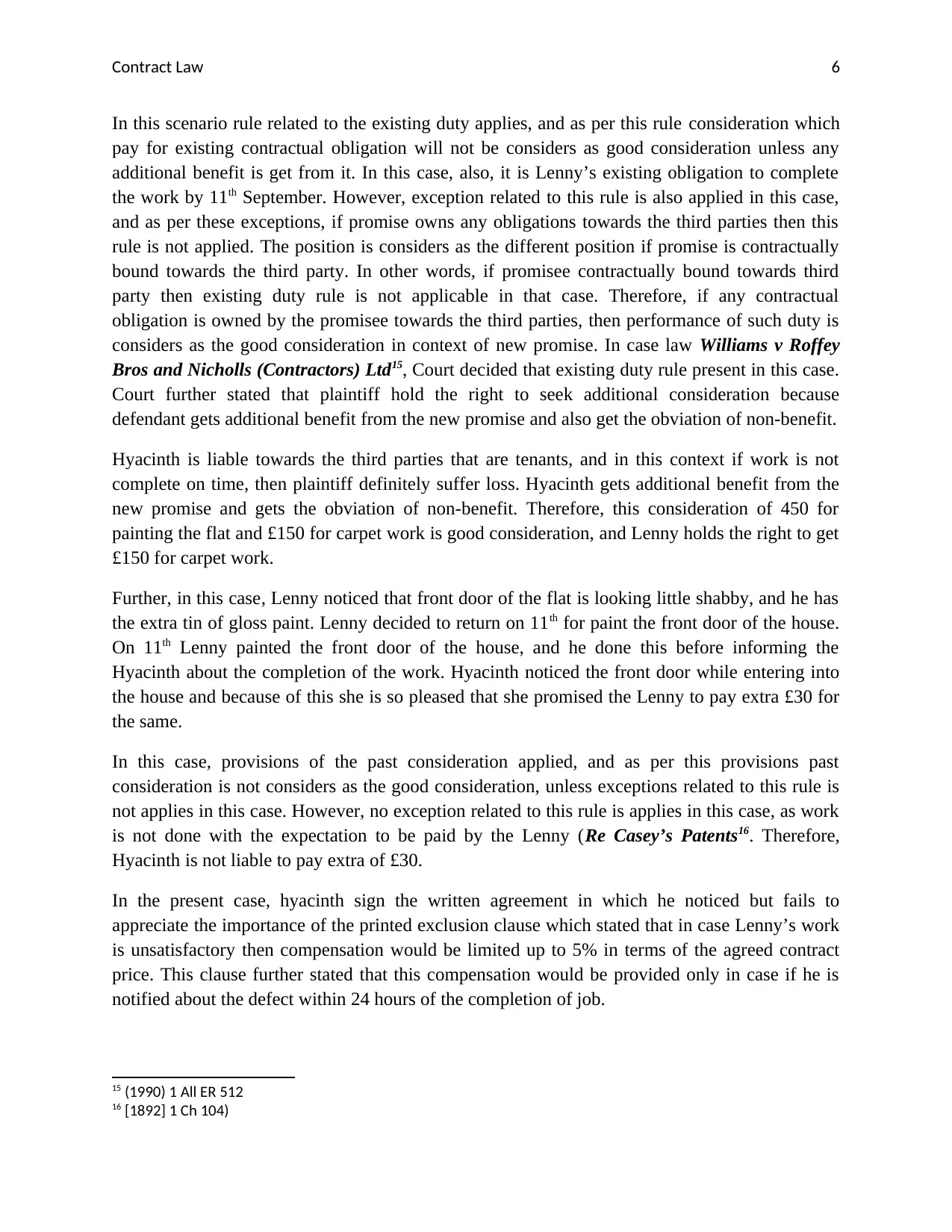
Contract Law 6
In this scenario rule related to the existing duty applies, and as per this rule consideration which
pay for existing contractual obligation will not be considers as good consideration unless any
additional benefit is get from it. In this case, also, it is Lenny’s existing obligation to complete
the work by 11th September. However, exception related to this rule is also applied in this case,
and as per these exceptions, if promise owns any obligations towards the third parties then this
rule is not applied. The position is considers as the different position if promise is contractually
bound towards the third party. In other words, if promisee contractually bound towards third
party then existing duty rule is not applicable in that case. Therefore, if any contractual
obligation is owned by the promisee towards the third parties, then performance of such duty is
considers as the good consideration in context of new promise. In case law Williams v Roffey
Bros and Nicholls (Contractors) Ltd15, Court decided that existing duty rule present in this case.
Court further stated that plaintiff hold the right to seek additional consideration because
defendant gets additional benefit from the new promise and also get the obviation of non-benefit.
Hyacinth is liable towards the third parties that are tenants, and in this context if work is not
complete on time, then plaintiff definitely suffer loss. Hyacinth gets additional benefit from the
new promise and gets the obviation of non-benefit. Therefore, this consideration of 450 for
painting the flat and £150 for carpet work is good consideration, and Lenny holds the right to get
£150 for carpet work.
Further, in this case, Lenny noticed that front door of the flat is looking little shabby, and he has
the extra tin of gloss paint. Lenny decided to return on 11th for paint the front door of the house.
On 11th Lenny painted the front door of the house, and he done this before informing the
Hyacinth about the completion of the work. Hyacinth noticed the front door while entering into
the house and because of this she is so pleased that she promised the Lenny to pay extra £30 for
the same.
In this case, provisions of the past consideration applied, and as per this provisions past
consideration is not considers as the good consideration, unless exceptions related to this rule is
not applies in this case. However, no exception related to this rule is applies in this case, as work
is not done with the expectation to be paid by the Lenny (Re Casey’s Patents16. Therefore,
Hyacinth is not liable to pay extra of £30.
In the present case, hyacinth sign the written agreement in which he noticed but fails to
appreciate the importance of the printed exclusion clause which stated that in case Lenny’s work
is unsatisfactory then compensation would be limited up to 5% in terms of the agreed contract
price. This clause further stated that this compensation would be provided only in case if he is
notified about the defect within 24 hours of the completion of job.
15 (1990) 1 All ER 512
16 [1892] 1 Ch 104)
In this scenario rule related to the existing duty applies, and as per this rule consideration which
pay for existing contractual obligation will not be considers as good consideration unless any
additional benefit is get from it. In this case, also, it is Lenny’s existing obligation to complete
the work by 11th September. However, exception related to this rule is also applied in this case,
and as per these exceptions, if promise owns any obligations towards the third parties then this
rule is not applied. The position is considers as the different position if promise is contractually
bound towards the third party. In other words, if promisee contractually bound towards third
party then existing duty rule is not applicable in that case. Therefore, if any contractual
obligation is owned by the promisee towards the third parties, then performance of such duty is
considers as the good consideration in context of new promise. In case law Williams v Roffey
Bros and Nicholls (Contractors) Ltd15, Court decided that existing duty rule present in this case.
Court further stated that plaintiff hold the right to seek additional consideration because
defendant gets additional benefit from the new promise and also get the obviation of non-benefit.
Hyacinth is liable towards the third parties that are tenants, and in this context if work is not
complete on time, then plaintiff definitely suffer loss. Hyacinth gets additional benefit from the
new promise and gets the obviation of non-benefit. Therefore, this consideration of 450 for
painting the flat and £150 for carpet work is good consideration, and Lenny holds the right to get
£150 for carpet work.
Further, in this case, Lenny noticed that front door of the flat is looking little shabby, and he has
the extra tin of gloss paint. Lenny decided to return on 11th for paint the front door of the house.
On 11th Lenny painted the front door of the house, and he done this before informing the
Hyacinth about the completion of the work. Hyacinth noticed the front door while entering into
the house and because of this she is so pleased that she promised the Lenny to pay extra £30 for
the same.
In this case, provisions of the past consideration applied, and as per this provisions past
consideration is not considers as the good consideration, unless exceptions related to this rule is
not applies in this case. However, no exception related to this rule is applies in this case, as work
is not done with the expectation to be paid by the Lenny (Re Casey’s Patents16. Therefore,
Hyacinth is not liable to pay extra of £30.
In the present case, hyacinth sign the written agreement in which he noticed but fails to
appreciate the importance of the printed exclusion clause which stated that in case Lenny’s work
is unsatisfactory then compensation would be limited up to 5% in terms of the agreed contract
price. This clause further stated that this compensation would be provided only in case if he is
notified about the defect within 24 hours of the completion of job.
15 (1990) 1 All ER 512
16 [1892] 1 Ch 104)
⊘ This is a preview!⊘
Do you want full access?
Subscribe today to unlock all pages.

Trusted by 1+ million students worldwide
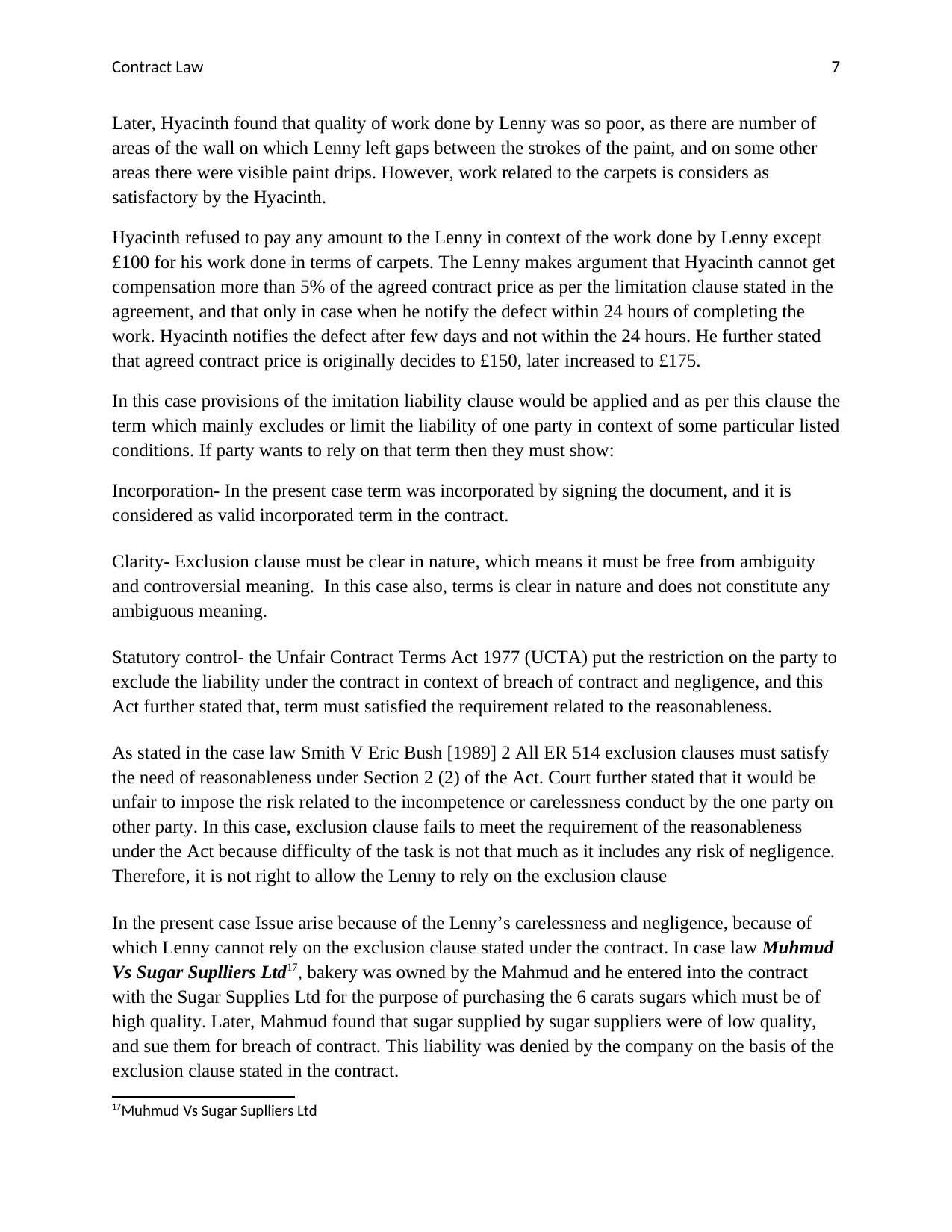
Contract Law 7
Later, Hyacinth found that quality of work done by Lenny was so poor, as there are number of
areas of the wall on which Lenny left gaps between the strokes of the paint, and on some other
areas there were visible paint drips. However, work related to the carpets is considers as
satisfactory by the Hyacinth.
Hyacinth refused to pay any amount to the Lenny in context of the work done by Lenny except
£100 for his work done in terms of carpets. The Lenny makes argument that Hyacinth cannot get
compensation more than 5% of the agreed contract price as per the limitation clause stated in the
agreement, and that only in case when he notify the defect within 24 hours of completing the
work. Hyacinth notifies the defect after few days and not within the 24 hours. He further stated
that agreed contract price is originally decides to £150, later increased to £175.
In this case provisions of the imitation liability clause would be applied and as per this clause the
term which mainly excludes or limit the liability of one party in context of some particular listed
conditions. If party wants to rely on that term then they must show:
Incorporation- In the present case term was incorporated by signing the document, and it is
considered as valid incorporated term in the contract.
Clarity- Exclusion clause must be clear in nature, which means it must be free from ambiguity
and controversial meaning. In this case also, terms is clear in nature and does not constitute any
ambiguous meaning.
Statutory control- the Unfair Contract Terms Act 1977 (UCTA) put the restriction on the party to
exclude the liability under the contract in context of breach of contract and negligence, and this
Act further stated that, term must satisfied the requirement related to the reasonableness.
As stated in the case law Smith V Eric Bush [1989] 2 All ER 514 exclusion clauses must satisfy
the need of reasonableness under Section 2 (2) of the Act. Court further stated that it would be
unfair to impose the risk related to the incompetence or carelessness conduct by the one party on
other party. In this case, exclusion clause fails to meet the requirement of the reasonableness
under the Act because difficulty of the task is not that much as it includes any risk of negligence.
Therefore, it is not right to allow the Lenny to rely on the exclusion clause
In the present case Issue arise because of the Lenny’s carelessness and negligence, because of
which Lenny cannot rely on the exclusion clause stated under the contract. In case law Muhmud
Vs Sugar Suplliers Ltd17, bakery was owned by the Mahmud and he entered into the contract
with the Sugar Supplies Ltd for the purpose of purchasing the 6 carats sugars which must be of
high quality. Later, Mahmud found that sugar supplied by sugar suppliers were of low quality,
and sue them for breach of contract. This liability was denied by the company on the basis of the
exclusion clause stated in the contract.
17Muhmud Vs Sugar Suplliers Ltd
Later, Hyacinth found that quality of work done by Lenny was so poor, as there are number of
areas of the wall on which Lenny left gaps between the strokes of the paint, and on some other
areas there were visible paint drips. However, work related to the carpets is considers as
satisfactory by the Hyacinth.
Hyacinth refused to pay any amount to the Lenny in context of the work done by Lenny except
£100 for his work done in terms of carpets. The Lenny makes argument that Hyacinth cannot get
compensation more than 5% of the agreed contract price as per the limitation clause stated in the
agreement, and that only in case when he notify the defect within 24 hours of completing the
work. Hyacinth notifies the defect after few days and not within the 24 hours. He further stated
that agreed contract price is originally decides to £150, later increased to £175.
In this case provisions of the imitation liability clause would be applied and as per this clause the
term which mainly excludes or limit the liability of one party in context of some particular listed
conditions. If party wants to rely on that term then they must show:
Incorporation- In the present case term was incorporated by signing the document, and it is
considered as valid incorporated term in the contract.
Clarity- Exclusion clause must be clear in nature, which means it must be free from ambiguity
and controversial meaning. In this case also, terms is clear in nature and does not constitute any
ambiguous meaning.
Statutory control- the Unfair Contract Terms Act 1977 (UCTA) put the restriction on the party to
exclude the liability under the contract in context of breach of contract and negligence, and this
Act further stated that, term must satisfied the requirement related to the reasonableness.
As stated in the case law Smith V Eric Bush [1989] 2 All ER 514 exclusion clauses must satisfy
the need of reasonableness under Section 2 (2) of the Act. Court further stated that it would be
unfair to impose the risk related to the incompetence or carelessness conduct by the one party on
other party. In this case, exclusion clause fails to meet the requirement of the reasonableness
under the Act because difficulty of the task is not that much as it includes any risk of negligence.
Therefore, it is not right to allow the Lenny to rely on the exclusion clause
In the present case Issue arise because of the Lenny’s carelessness and negligence, because of
which Lenny cannot rely on the exclusion clause stated under the contract. In case law Muhmud
Vs Sugar Suplliers Ltd17, bakery was owned by the Mahmud and he entered into the contract
with the Sugar Supplies Ltd for the purpose of purchasing the 6 carats sugars which must be of
high quality. Later, Mahmud found that sugar supplied by sugar suppliers were of low quality,
and sue them for breach of contract. This liability was denied by the company on the basis of the
exclusion clause stated in the contract.
17Muhmud Vs Sugar Suplliers Ltd
Paraphrase This Document
Need a fresh take? Get an instant paraphrase of this document with our AI Paraphraser
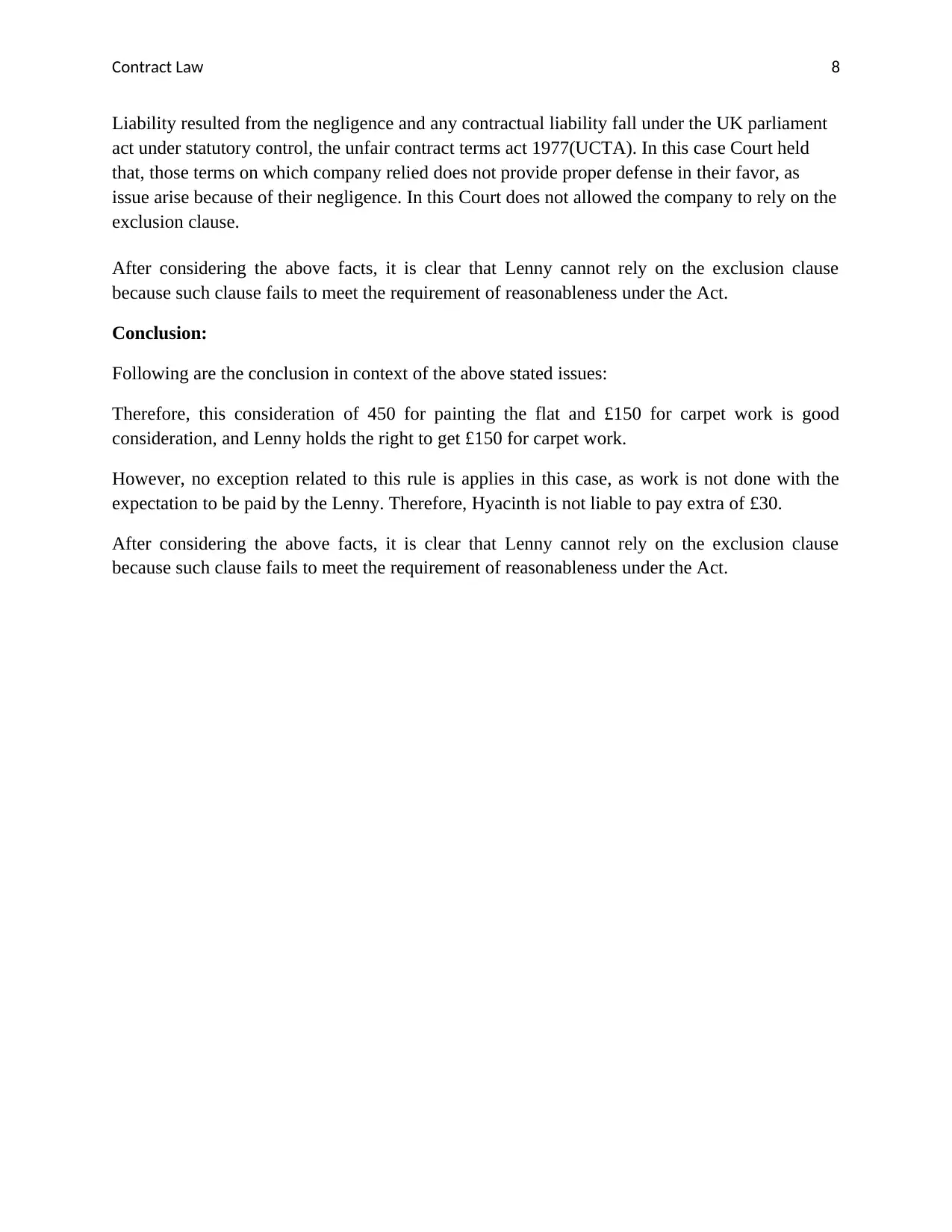
Contract Law 8
Liability resulted from the negligence and any contractual liability fall under the UK parliament
act under statutory control, the unfair contract terms act 1977(UCTA). In this case Court held
that, those terms on which company relied does not provide proper defense in their favor, as
issue arise because of their negligence. In this Court does not allowed the company to rely on the
exclusion clause.
After considering the above facts, it is clear that Lenny cannot rely on the exclusion clause
because such clause fails to meet the requirement of reasonableness under the Act.
Conclusion:
Following are the conclusion in context of the above stated issues:
Therefore, this consideration of 450 for painting the flat and £150 for carpet work is good
consideration, and Lenny holds the right to get £150 for carpet work.
However, no exception related to this rule is applies in this case, as work is not done with the
expectation to be paid by the Lenny. Therefore, Hyacinth is not liable to pay extra of £30.
After considering the above facts, it is clear that Lenny cannot rely on the exclusion clause
because such clause fails to meet the requirement of reasonableness under the Act.
Liability resulted from the negligence and any contractual liability fall under the UK parliament
act under statutory control, the unfair contract terms act 1977(UCTA). In this case Court held
that, those terms on which company relied does not provide proper defense in their favor, as
issue arise because of their negligence. In this Court does not allowed the company to rely on the
exclusion clause.
After considering the above facts, it is clear that Lenny cannot rely on the exclusion clause
because such clause fails to meet the requirement of reasonableness under the Act.
Conclusion:
Following are the conclusion in context of the above stated issues:
Therefore, this consideration of 450 for painting the flat and £150 for carpet work is good
consideration, and Lenny holds the right to get £150 for carpet work.
However, no exception related to this rule is applies in this case, as work is not done with the
expectation to be paid by the Lenny. Therefore, Hyacinth is not liable to pay extra of £30.
After considering the above facts, it is clear that Lenny cannot rely on the exclusion clause
because such clause fails to meet the requirement of reasonableness under the Act.
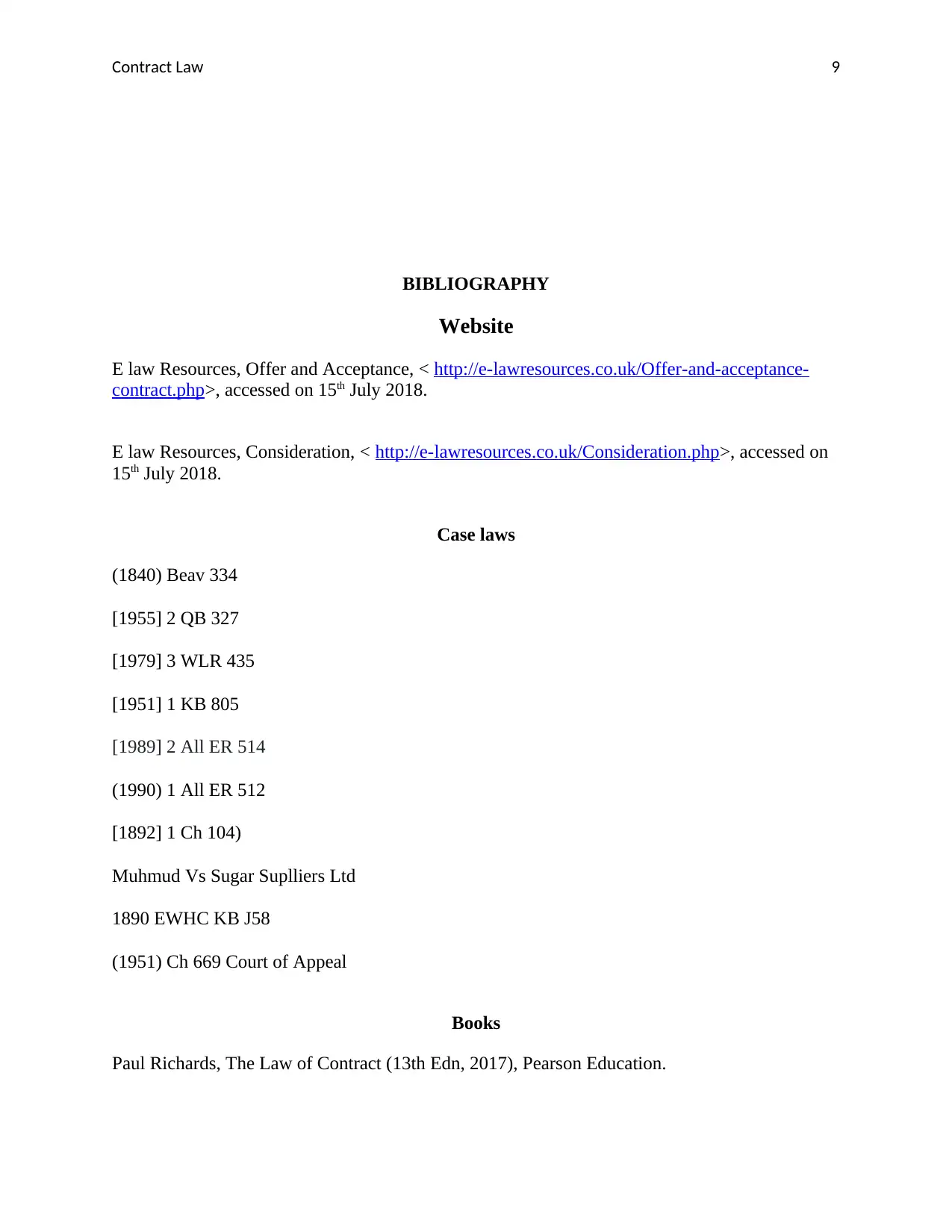
Contract Law 9
BIBLIOGRAPHY
Website
E law Resources, Offer and Acceptance, < http://e-lawresources.co.uk/Offer-and-acceptance-
contract.php>, accessed on 15th July 2018.
E law Resources, Consideration, < http://e-lawresources.co.uk/Consideration.php>, accessed on
15th July 2018.
Case laws
(1840) Beav 334
[1955] 2 QB 327
[1979] 3 WLR 435
[1951] 1 KB 805
[1989] 2 All ER 514
(1990) 1 All ER 512
[1892] 1 Ch 104)
Muhmud Vs Sugar Suplliers Ltd
1890 EWHC KB J58
(1951) Ch 669 Court of Appeal
Books
Paul Richards, The Law of Contract (13th Edn, 2017), Pearson Education.
BIBLIOGRAPHY
Website
E law Resources, Offer and Acceptance, < http://e-lawresources.co.uk/Offer-and-acceptance-
contract.php>, accessed on 15th July 2018.
E law Resources, Consideration, < http://e-lawresources.co.uk/Consideration.php>, accessed on
15th July 2018.
Case laws
(1840) Beav 334
[1955] 2 QB 327
[1979] 3 WLR 435
[1951] 1 KB 805
[1989] 2 All ER 514
(1990) 1 All ER 512
[1892] 1 Ch 104)
Muhmud Vs Sugar Suplliers Ltd
1890 EWHC KB J58
(1951) Ch 669 Court of Appeal
Books
Paul Richards, The Law of Contract (13th Edn, 2017), Pearson Education.
⊘ This is a preview!⊘
Do you want full access?
Subscribe today to unlock all pages.

Trusted by 1+ million students worldwide
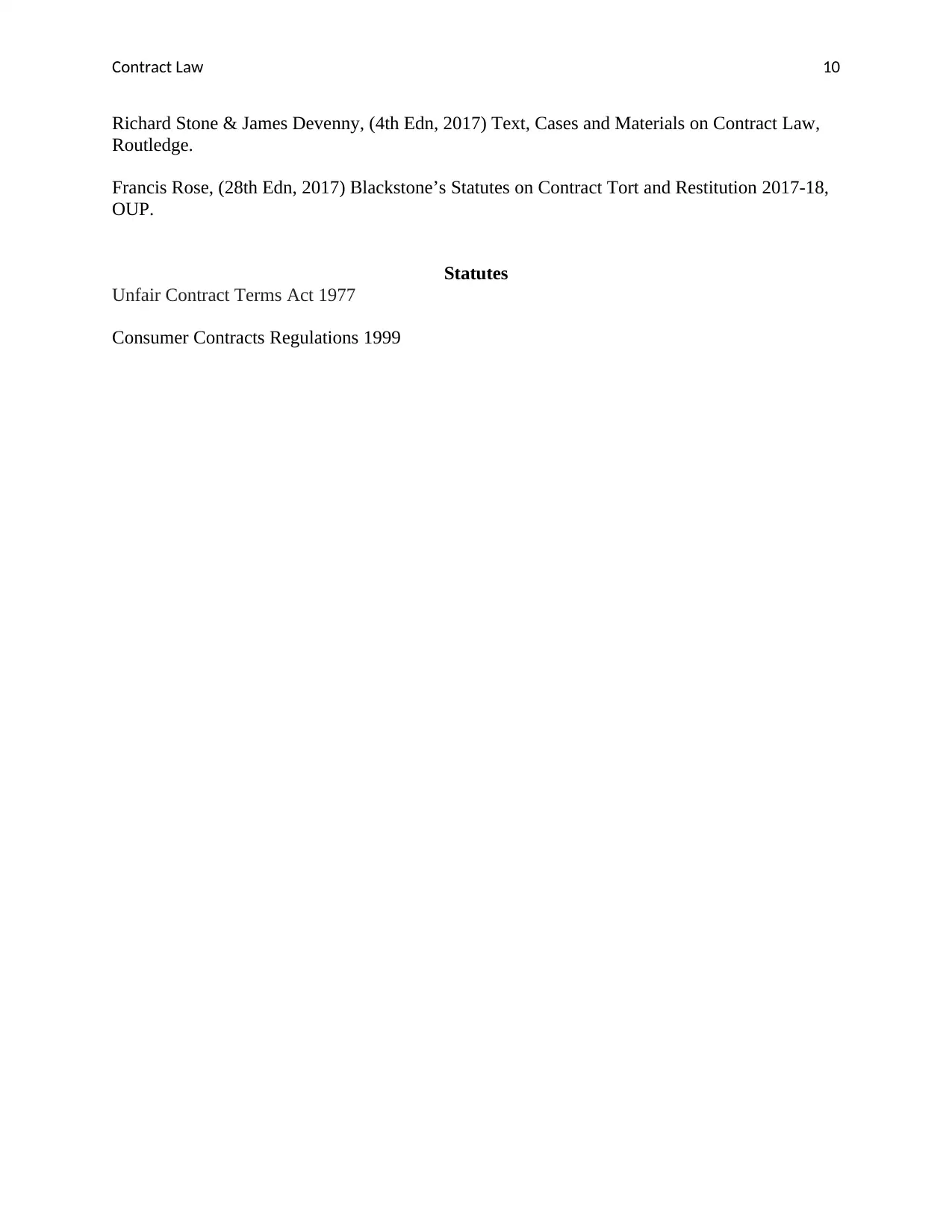
Contract Law 10
Richard Stone & James Devenny, (4th Edn, 2017) Text, Cases and Materials on Contract Law,
Routledge.
Francis Rose, (28th Edn, 2017) Blackstone’s Statutes on Contract Tort and Restitution 2017-18,
OUP.
Statutes
Unfair Contract Terms Act 1977
Consumer Contracts Regulations 1999
Richard Stone & James Devenny, (4th Edn, 2017) Text, Cases and Materials on Contract Law,
Routledge.
Francis Rose, (28th Edn, 2017) Blackstone’s Statutes on Contract Tort and Restitution 2017-18,
OUP.
Statutes
Unfair Contract Terms Act 1977
Consumer Contracts Regulations 1999
1 out of 10
Related Documents
Your All-in-One AI-Powered Toolkit for Academic Success.
+13062052269
info@desklib.com
Available 24*7 on WhatsApp / Email
![[object Object]](/_next/static/media/star-bottom.7253800d.svg)
Unlock your academic potential
Copyright © 2020–2025 A2Z Services. All Rights Reserved. Developed and managed by ZUCOL.





